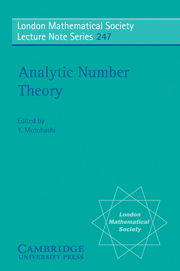Book contents
- Frontmatter
- Contents
- Foreword
- Speakers
- 1 Subvarieties of Linear Tori and the Unit Equation A Survey
- 2 Remarks on the Analytic Complexity of Zeta Functions
- 3 Normal Distribution of Zeta Functions and Applications
- 4 Goldbach Numbers and Uniform Distribution
- 5 The Number of Algebraic Numbers of Given Degree Approximating a Given Algebraic Number
- 6 The Brun–Titchmarsh Theorem
- 7 A Decomposition of Riemann's Zeta-Function
- 8 Multiplicative Properties of Consecutive Integers
- 9 On the Equation (xm – 1)/(x – 1) = yq with x Power
- 10 Congruence Families of Exponential Sums
- 11 On Some Results Concerning the Riemann Hypothesis
- 12 Mean Values of Dirichlet Series via Laplace Transforms
- 13 The Mean Square of the Error Term in a Genelarization of the Dirichlet Divisor Problem
- 14 The Goldbach Problem with Primes in Arithmetic Progressions
- 15 On the Sum of Three Squares of Primes
- 16 Trace Formula over the Hyperbolic Upper Half Space
- 17 Modular Forms and the Chebotarev Density Theorem II
- 18 Congruences between Modular Forms
- 19 Regular Singularities in G-Function Theory
- 20 Spectral Theory and L-functions
- 21 Irrationality Criteria for Numbers of Mahler's Type
- 22 Hypergeometric Functions and Irrationality Measures
- 23 Forms in Many Variables
- 24 Remark on the Kuznetsov Trace Formula
8 - Multiplicative Properties of Consecutive Integers
Published online by Cambridge University Press: 08 April 2010
- Frontmatter
- Contents
- Foreword
- Speakers
- 1 Subvarieties of Linear Tori and the Unit Equation A Survey
- 2 Remarks on the Analytic Complexity of Zeta Functions
- 3 Normal Distribution of Zeta Functions and Applications
- 4 Goldbach Numbers and Uniform Distribution
- 5 The Number of Algebraic Numbers of Given Degree Approximating a Given Algebraic Number
- 6 The Brun–Titchmarsh Theorem
- 7 A Decomposition of Riemann's Zeta-Function
- 8 Multiplicative Properties of Consecutive Integers
- 9 On the Equation (xm – 1)/(x – 1) = yq with x Power
- 10 Congruence Families of Exponential Sums
- 11 On Some Results Concerning the Riemann Hypothesis
- 12 Mean Values of Dirichlet Series via Laplace Transforms
- 13 The Mean Square of the Error Term in a Genelarization of the Dirichlet Divisor Problem
- 14 The Goldbach Problem with Primes in Arithmetic Progressions
- 15 On the Sum of Three Squares of Primes
- 16 Trace Formula over the Hyperbolic Upper Half Space
- 17 Modular Forms and the Chebotarev Density Theorem II
- 18 Congruences between Modular Forms
- 19 Regular Singularities in G-Function Theory
- 20 Spectral Theory and L-functions
- 21 Irrationality Criteria for Numbers of Mahler's Type
- 22 Hypergeometric Functions and Irrationality Measures
- 23 Forms in Many Variables
- 24 Remark on the Kuznetsov Trace Formula
Summary
Introduction A variety of conjectures in number theory are based on the heuristic that the multiplicative structures of consecutive integers are independent. Thus, one would normally expect the probability that two consecutive integers n and n + 1 both possess a given multiplicative property to be approximately the square of the probability that an individual integer n possesses this property. Of course, there may be obstructions preventing this (as in the case of the property “divisible by 2”), but these obstructions are usually related to congruence conditions, and the problem is easily modified to take into account such conditions.
While it is easy to formulate conjectures based on such independence assumptions, these conjectures often turn out to be extremely difficult to prove and in many cases seem intractable. The most famous problem of this type is the twin prime conjecture according to which n and n + 2 are simultaneously prime infinitely often. A quantitative form of this conjecture asserts that the probability that n and n + 2 are both prime is proportional to (log n)-2, the square of the probability that an individual integer n is prime.
We consider here more general problems such as that of proving, under suitable conditions on the multiplicative structure of a set A of positive integers, the existence of infinitely many integers n (or a positive proportion of integers n) such that both n and n + 1 belong A. Over the past decade, there has been some progress on problems of this type, but many open questions remain. The purpose of this paper is to give a survey of results that have been obtained and to discuss some open problems that arise in this connection.
Information
- Type
- Chapter
- Information
- Analytic Number Theory , pp. 103 - 118Publisher: Cambridge University PressPrint publication year: 1997
Accessibility standard: Unknown
Why this information is here
This section outlines the accessibility features of this content - including support for screen readers, full keyboard navigation and high-contrast display options. This may not be relevant for you.Accessibility Information
- 1
- Cited by
